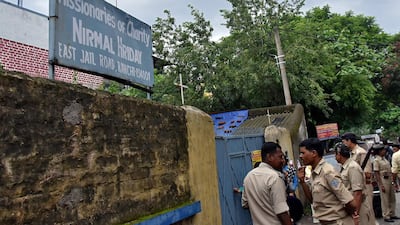Indian state governments will investigate every childcare home run by the Missionaries of Charity, the order set up by Mother Teresa, after two women in a home were arrested for selling babies into adoption.
The women, Sister Konsalia Balsa and an employee named Anima Indwar, were accused of having sold three babies from a Missionary of Charity home in Ranchi, the state capital of Jharkhand in northeast India. They were arrested on July 5, allegedly before they could sell a fourth child for 120,000 rupees (Dh6,441), Jharkhand police said.
Sister Balsa had confessed to the sales of the babies, police state in a statement. But Theodore Mascarenhas, the bishop of Ranchi, claimed that the nun had been forced to confess, and that the police—which is controlled by the Jharkhand government, run by the Hindu nationalist Bharatiya Janata Party (BJP)—was “treating the whole of Mother Teresa’s organisation as a criminal gang.”
Mother Teresa set up the Missionaries of Charity in Calcutta (now Kolkata) in 1950. Since then, it has opened at least 30 orphanages and childcare homes across India, in various states. A Nobel-laureate, Mother Teresa was canonised for her charitable work by the Catholic Church in 2016.
The order made no comment on the investigations of its homes, which were ordered on Tuesday by Maneka Gandhi, India’s minister for women and children. But a statement from the order’s headquarters in Kolkata said that it was “completely shocked by what has happened in our home in Ranchi… It should have never happened. It is against our moral convictions. We are carefully looking into the matter.”
Apart from Bishop Mascarenhas, others have criticised the manner of the Jharkhand police’s inquiry into the Ranchi incident. Mamata Banerjee, the chief minister of West Bengal, accused the BJP of “malicious attempts to malign” the Missionaries of Charity.
The accusations against the Ranchi home also point to India’s struggles to cut down on illegal adoptions and other modes of child trafficking.
_______________
Read more by Samanth Subramanian:
Smartphone rumours spark series of mob killings in India
'Bicycle mayor' faces an uphill task in Bengaluru
The tragic death that inspired Ireland's pro-choice campaign
_______________
In 2015, the Indian government revised its adoption laws, with Ms Gandhi’s ministry simplifying some of the necessary procedures for prospective parents. The streamlining was an urgent matter. India has roughly 30 million orphans, and at least 230,000 children reside in registered and unregistered childcare shelters, according to the National Commission for Protection of Child Rights.
But the process is still slow, particularly because courts hearing adoption cases tend to be overburdened with work. Roughly 15,000 parents are on the waitlist to adopt a child at the moment. In contrast, only 2,671 children were adopted between January 2016 and March 2017—the most recent period for which figures were available.
The 2015 laws also made it mandatory for childcare institutions to register with the Central Adoption Resource Authority (CARA). Around 2,300 shelters have registered, but at least 4,000 more have yet to do so. Ms Gandhi additionally ordered, on Tuesday, that all pending registrations be completed within a month.
The Missionaries of Charity had decided to stop putting its wards up for adoption in 2015, after the new laws enabled single parents and divorced parents to adopt children—which the order said was against its philosophy.
The comparative lack of regulation and data in the past made it difficult to assess the scale of the illegal adoption problem today, said Bhuwan Ribhu, an activist with Bachpan Bachao Andolan, a child rights organisation whose founder, Kailash Satyarthi, won the Nobel Peace Prize in 2014.
The 2015 laws were "the first attempt of any kind in India to regulate these child care institutions," Mr Ribhu told The National. "So of course, there will be teething troubles. But the important thing is that these institutions must be registered. To not register is an offence."
Police have also struggled to describe the scale of the illegal adoption network, so it can only be gauged by the rare incident that hits the public eye. Last year, for instance, two officials of a Kolkata child shelter were arrested for selling 17 children to couples overseas, for prices ranging from $12,000 to $23,000.
How commonplace such sales are, Mr Ribhu said, “we just don’t know. But hopefully in a year or two years, as the law is enforced, we will begin to have a better idea.”

